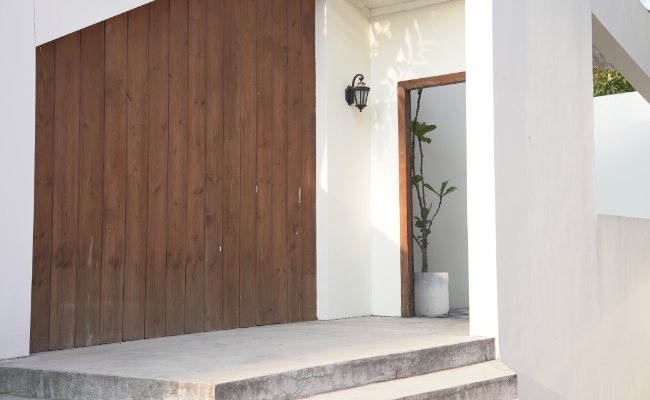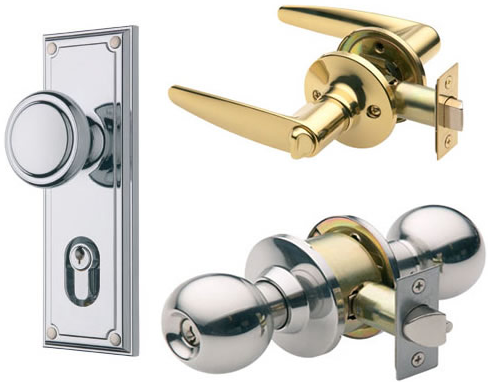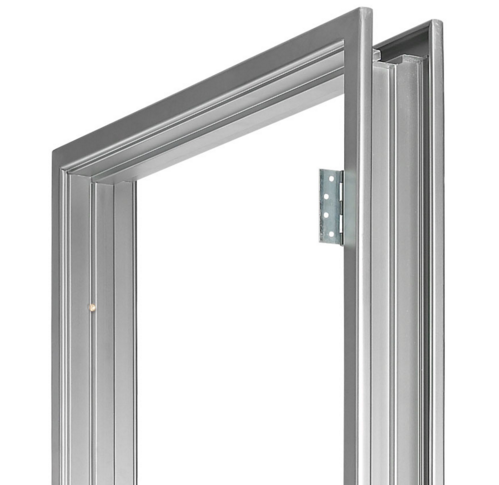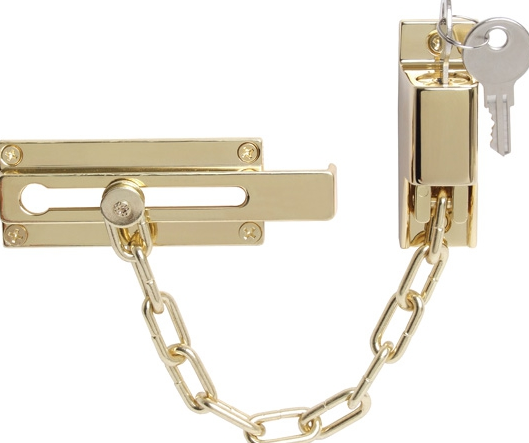How to Secure Front Door: Things You Need to Know

The front door is often the primary entry point for burglars. Statistics show that nearly 34% of burglars enter through a front door. Therefore, securing the front door is one of the most essential parts of home safety. It can prevent intruders from entering your house or apartment and keep you and your loved ones safe.
However, properties need to be equipped with a proper door, which does not stop people who are not invited into your home and increases the likelihood of a break-in. The good news is there are many ways to secure your front door from being kicked in by burglars. We will show you 12 ways to safeguard and protect your front door. Some tips can also apply to back door security, including door securing hardware, locks, hinges, and frames.
Why Need to Make Your Front Door More Secure?
Making your front door more secure is essential for several reasons. Enhancing front door security can significantly reduce the risk of unauthorized access and potential break-ins. A closed front door protects your property and your family from potential threats and intruders. Knowing that your front door is secure can provide peace of mind, making you feel safer and more comfortable in your home.
How to Secure Front Door: Top 12 Effective Ways
There are many ways to secure your front door from being kicked in by burglars. Here are some of them.
1. Evaluate Your Front Door Status
Evaluating your front door status helps you identify vulnerabilities and determine the most effective security measures. Some potential vulnerabilities include weak locks, damaged frames, or stealing gaps. Identifying these weaknesses is the first step in addressing them and making your home more secure.
2. Upgrade Locks and Deadbolts
Upgrade your door lock to the most secure one to prevent kick-ins. A wide range of deadbolt locks and deadlocks are available that make it much more difficult for burglars to force their way into your rented property. Deadbolt locks, except for sliding doors, can be added to most exterior doors. The most secure deadbolt locks are solid metal and have no exposed screws. If your door already has an inferior deadbolt, it may be time to replace it with a higher-quality product that makes entering the property as difficult as possible.
Deadlocks make doors even more secure. This type of lock does not have a key on the outside, making it extremely difficult to enter a premise without using much force or finding a way to destroy the lock.

3. Install a Security Camera or Video Doorbell
The front door should be something other than your home's last line of defense. You can install a security camera at your doorstep or add a video doorbell to your front door. These devices allow you to monitor your property and realize effective access control. Advanced models even come with motion detection; they will send you real-time notifications if there are some abnormal activities.
4. Reinforce Door Frames and Hinges
Hinge is a necessary part of a security front door, which makes a big difference in home safeguarding. Burglars often prefer to destroy a door swinging out, with the hinge pins exposed outside the house. So make sure the hinge is on the inside of the front door. If not, secure the front door hinge with strong, unmovable pins. You can also use setscrew and studs to add security.
Take home security seriously, even if your front door is made of solid metal with a sturdy lock installed. A secure and strengthened door frame should be addressed. A security forum once revealed a theft because the burglar pried the door frame. You can install several screws along the frame and doorstop to harden and secure the door frames to the wall.

5. Add a Peephole and Security Chain
A peephole, a door viewer, lets you see who is outside your door without opening it. This visual verification is crucial because it enables you to confirm the identity of visitors or delivery personnel before granting them access. It's beneficial when someone unexpected or unfamiliar comes to your door.
When properly installed, a security chain lets you open the door while keeping it latched partially. This chain provides an additional layer of security by creating a physical barrier that prevents someone from forcing into your home when you open the door.
6. Change Door Hardware
Door hardware includes hinges, handles, locks, fasteners, and accessories. You will realize how easy breaking in a front door is if it has old hardware. With two kicks in only five seconds, robbers can damage the door jamb and get access into your house.
Thus, check if your front door hardware needs a change, and if you buy new, make sure you purchase them in a trusted professional door hardware store. Check every part of the hardware, including security door knobs, locks, hinges, etc.

7. Protect Glass Panels
A large number of doors include panes of glass. Some of these panes of glass are embedded in the door itself, while many glass panels surround other doors. This makes it more tempting and easier for burglars to break into your home.
They have to break the glass and open the door. However, if you replace this type of door with a windowless door, burglars avoid this door and look for an easier target elsewhere. If you can't replace your door with a windowless model, you can reinforce the glass in your door by applying unbreakable panels to the glass areas of your door.
8. Enhance Front Door Lighting
Burglars and other unwanted guests are less likely to approach a home with plenty of lighting because they can be easily identified. Installing motion sensors or lighting systems get activated when it gets dark. The outdoor lighting will act as an excellent deterrent, ensuring that you have good visibility around the door.
9. Switch Your Front Door to a Solid-Core One
Many people worry more about the style and color of a door rather than the safety and security it provides. This is a huge mistake and could be costly in the future. Some older doors are hollow, so it's important to check this and determine your existing doors' strength. If they need to be replaced, you should ensure the new entries are made of high-quality materials such as metal, solid wood, or fiberglass.
- Metal or steel doors are often considered the best choice for exterior door security because of their insulation factor. And they are always hard for burglars to intrude.
- Wood-made front doors are also suitable for protecting your house, but ensure it is solid and robust enough.
- Glass doors are not recommended to be installed as front doors since they are easy to destroy. But if you prefer to use this kind, ensure it has as little glass embedded as possible. The next tip explains more details about securing glass front doors.
10. Consider a Letterbox Guard
The design and placement of the letterbox can also affect the security of your front door. If your letterbox is large and positioned close to the ground, it can be a potential entry point for burglars to reach in and unlock the door from the inside. In some cases, homeowners can install a letterbox guard or security plate inside the door to reinforce the area around the letterbox. The guard can prevent tampering with the lock or handle from the outside.
11. Maintain Visibility and Deter Hiding Spots
Remove every obstruction from your front door to the main visibility. Ensure that your front door is clear of any obstacles or items that could act as cover for a potential burglar. Some common hiding spots include plants, outdoor furniture, trees, or bushes that obstruct your view and make life easier for a potential criminal.
12. Always Lock Your Front Door
The easiest way to secure your front door is to lock it. Many homeowners may forget to lock their front door when hurrying out for work. You can easily set a reminder on your mobile phone to ensure you lock it at a specific time. You can install a high-tech lock to lock or unlock the door anywhere.
Common Front Door Security Risks
Several common front door security risks can make your home more vulnerable to intrusions.
- Weak locks: Inadequate or low-quality locks are a significant security risk. Over time, locks can wear down, making them easier to pick or manipulate. Burglars can easily break these locks and walk in without any obstruction.
- Visible spare keys: Many locks have a backup, and more users store them near the front door in case of emergencies. However, hiding spare keys near the front door, such as under a doormat or flowerpot, can provide easy access for intruders.
- Lack of peephole or viewer: Some old doors need a peephole. Without a peephole, you may need to open the door to see who's outside, potentially exposing yourself to strangers.
- Windows near the door In some houses, the windows are placed near the front door. Burglars can break these windows to gain access.
- No security features: Lack of additional security features can make your front door more susceptible to intrusion. Standard security features include security bars, strike plates, or door viewers.
FAQs
How do I secure my front door from burglars?
There are several effective ways to secure your front door. For example, you can upgrade your locks and deadbolts, add a peephole and security chain, install security cameras, light up your doorstep, or switch your front door to a solid-core one. Every front door and home is unique, and security needs vary widely. You can choose the most suitable security methods according to your needs.
What is the best door to avoid burglary?
There is no one-size-fits-all answer to the best door to avoid burglary, as home security depends on multiple factors, including the door material, frame, locks, and overall installation. A solid-core door is highly recommended if you want to replace your door with a new one. Solid-core doors made of wood or metal are more secure than hollow-core doors. They are harder to kick in or force open. Steel doors, in particular, offer excellent resistance to intrusion.
What time of the day do most burglaries occur?
According to statistics, 65% of burglaries happen during the day. And in the daytime, most break-ins occur between 10 a.m. and 3 p.m., specifically after lunch from 12:30–1:00 p.m.
What makes the front door susceptible to home intrusions?
Front doors can be susceptible to home intrusions for several reasons. Inadequate or poorly installed locks on front doors can easily be picked, bumped, or forced open by intruders. It can be easily kicked in or breached if your front door is made of weak materials, such as hollow-core wood. Moreover, dimly lit entryways or surroundings create hiding spots for intruders, making it easier for them to approach and tamper with the front door unnoticed.
Conclusion
Securing the front door of your house should be one of your main priorities to protect your home from burglars. If it is easy to enter your home, you could pay a heavy price. Try these methods above to burglar-proof your front door. If you have other tips to keep your front door safe, tell us by leaving a comment below, and please share this article with your family and friends if you find it useful.
Related Posts
Securing just your front door won't provide complete protection against burglars; it's essential to combine various security measures. Explore the following articles for more insights.
Search
Subscribe for the Latest Updates
Security insights & offers right into your inbox
